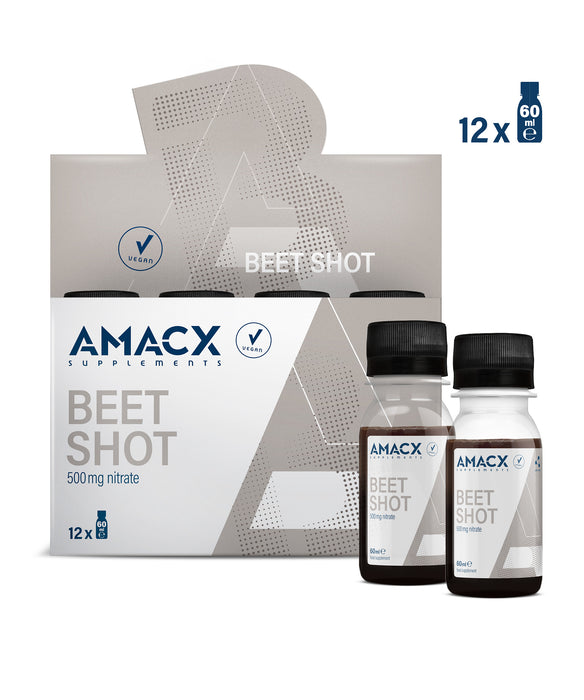
Amacx Beet shot 12 pack
Shipping costs for orders under €50

Carbohydrates, electrolytes, caffeine, creatine, beta-alanine, beetroot juice, magnesium, omega-3, vitamin D – the list of supplements that supposedly make cyclists faster, more enduring, and healthier is long. But which of these actually provide benefits – and which are a complete waste of money?
Von Isatou Schulz |
3 minutes read time

In this article, you will get an overview of common nutritional supplements in cycling, their scientific evidence, and the question of whether and when their use makes sense.
The foundation of any athletic performance is and remains nutrition. Eating a balanced diet, getting enough sleep, recovering, and training regularly lays the foundation for progress. Supplements, as the name suggests, are additions — not miracle cures.
However, targeted dietary supplements can be useful in certain situations:
In case of increased demand due to intensive training
In case of deficiency symptoms
In competitive situations where every watt counts
Benefits: Provides energy and maintains muscle function during longer rides.
When: Rides lasting over 60–90 minutes, especially in competitions or intervals.
Form: gels, bars, drinks.
Conclusion: Useful – especially for long rides or races.
Benefits: Proven increase in endurance performance and delayed fatigue.
When: Before competition or intensive training block (approx. 3–6 mg/kg body weight).
Conclusion: Useful – if taken in the right dosage and not too late (sleep!).
Benefits: Promotes explosive strength during short, intense exercise.
When: In disciplines with many sprints, e.g. criterium, MTB, gravel.
Conclusion: Partially useful – less relevant in road cycling with constant speed.
Benefits: Can improve oxygen efficiency.
When: In the days before an important competition or time trial (pay attention to the dosage!).
Conclusion: Can be useful – not equally effective for everyone.
Benefits: Important for muscle and immune function.
When: Get tested, especially in winter, before supplementing.
Conclusion: Only useful in case of deficiency – otherwise no performance improvement.
Benefits: Often taken to treat cramps, but its effectiveness is not scientifically proven.
When: Useful when there is an actual shortage – which very few people have.
Conclusion: Mostly unnecessary – it is better to ensure a good supply of minerals through diet.
Benefits: Muscle building & regeneration – but unnecessary if you have sufficient protein intake.
Conclusion: Waste of money – a normal diet is enough.
Benefits: Often overdosed, possible side effects with long-term use.
Conclusion: Only in case of proven deficiency and medical recommendation.
Benefits: Protection against oxidative stress – but: Can even inhibit training adaptation.
Conclusion: Do not take it in bulk – it is better to get antioxidants from food (e.g. berries).
Not all supplements that subjectively "work" also do so measurably. But the placebo effect is real – if you firmly believe in your pre-race ritual, it can help mentally. But that doesn't justify every expenditure.
The supplement industry thrives on promises – often with attractive packaging and pseudoscientific rhetoric. Those who back up their advertising with studies should take a closer look: How large was the study? Who funded it? Was the effect truly relevant?
| Supplement | Evidence-based useful? | Who is it particularly suitable for? |
|---|---|---|
| Carbohydrates | ✅ Yes | All at >90 min load |
| Electrolytes | ✅ Yes | Sweaters, heat events |
| Caffeine | ✅ Yes | Competition, hard training |
| Beetroot | ✅ Yes (individual) | Time trial, race |
| Creatine | 🔶 Partially | Sprinters, Gravel, MTB |
| Vitamin D | 🔶 Only in case of shortage | All in winter (after blood test) |
| Magnesium | ❌ Hardly | Only in case of shortage |
| Multivitamins | ❌ No | Not recommended without diagnosis |
| Antioxidants | ❌ No | Can even be counterproductive |
Have your blood levels checked before taking vitamins or minerals.
Pay attention to quality – especially with cheap products from the Internet.
Long-term nutrition is more important than short-term “pimping” with powders.
No experiments on competition day – test everything in training beforehand!
Supplements can be a useful addition to cycling – but only if they are used in a targeted, evidence-based manner and not as a substitute for training and nutrition.
If you're unsure which supplements are right for you, talk to a sports nutritionist or doctor with experience in endurance sports. And don't forget: Your best "supplement" is still consistent training and a good breakfast 😉🚴